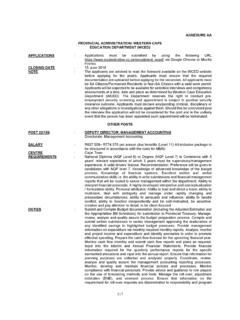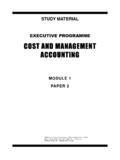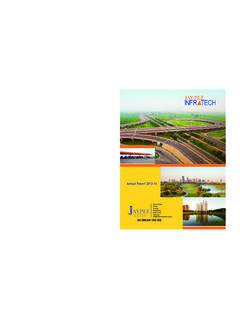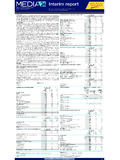Transcription of GOVERNMENT OF KARNATAKA DEPARTMENT OF TREASURIES
1 1 GOVERNMENT OF KARNATAKA DEPARTMENT OF TREASURIES CITIZEN S CHARTER-2015 A CHARTER OF RIGHTS 2 VISION AND MISSION OF THE TREASURY DEPARTMENT Ensuring all round transparency in dealing with public finance and safe guarding GOVERNMENT money. Eliminating all systemic deficiencies by adopting information technology and providing necessary support for good Governance through better management of public finances. 2. FUNCTIONS OF TREASURIES Processing of claims of various GOVERNMENT departments / Zilla Panchayath, Taluk Panchayaths and passing of bills for payment, after due validation as per Treasury Code. Countersigning of challans and accounting for revenue receipts, and rendering them to the concerned revenue earning Departments and also to the Accountant General.
2 Maintaining Deposit accounts, accounts, Local funds and other deposits and rendering expenditure accounts to the Accountant General and Zilla Panchayaths and Taluk Panchayaths as may be the case. Maintaining Savings Bank account and rendering detailed accounts to the Accountant General. Maintaining pension records of various pensioners like Railways, Freedom Fighters and Defence Pensioners and disbursing monthly pensions to pensioners, both at the Treasury Counter and Public Sector Banks. Keeping Articles of different categories like temple jewellery question papers of examinations of (SSLC, PUC, TCH & KPSC etc.,) and election materials in safe custody. Despatching OAP, PHP, and DWP and SSY Pensions which are social security schemes of State GOVERNMENT through money order.
3 Preparation of list of monthly compiled accounts of expenditure incurred on various schemes. Rendition of Accounts to the Accountant General, , of ZPs and s of Taluk Panchayath, supported with physical vouchers every month. Maintenance of HDFC loan accounts of GOVERNMENT Servants and periodic submission of accounts to the GOVERNMENT Payment of interest on belated payment settlement of pension and gratuity to pensioners. 3. CODES AND PROCEDURES GOVERNMENT transactions in the Treasury are governed by the provisions laid down in KFC, KTC (Volume I/II), MCE and Budget Manual. In pursuance of the powers vested with powers, vide Article 150 of the Constitution, to prescribe the principles of accounting and classification, classification structure heads of account up to object head level, for classification of various types of transaction of GOVERNMENT , the form in which the initial and subsidiary accounts shall be kept and the form in which accounts shall be rendered to the Accountant General.
4 Agency Banks conducts Cash transactions of the Treasury under an agreement between the State GOVERNMENT and the Bank. 4. CONSTITUTION OF TREASURIES IN THE STATE: Presently there are 34 District TREASURIES (including Pension Payment Treasury, State Huzur Treasury and the Stamp Depot at Bangalore, one additional District Treasury at Hubli) in the 30 Revenue districts of the State. There are 182 Sub TREASURIES in the State. The following officers, exercise powers and perform functions of TREASURIES under the KARNATAKA Treasury Code. Director of TREASURIES at State Level. Additional Directors at the directorate of TREASURIES Joint Director of TREASURIES at the directorate of TREASURIES . 3 Joint Director of TREASURIES at the TNMC, Bangalore. Joint Director at Mysore Belgaum and Kalburgi Deputy Directors : directorate of TREASURIES TNMC and NPS, State Huzur Treasury, Bangalore Rural Treasury, Pension payment Treasury, District Treasury Bidar Ballary,Kolar,Chitradurga,Tumakur,Daveng ere,Ramnagar,Shivmoga,Manglore, Dharwad, Chickmangalore, Hassan, Chamrajnagra, Udupi, Mandya, Koppal, Raichur and Vijayapur.
5 Assistant Director/District Treasury Officers Stamp Depot, Bangalore,District Treasury Urban Banglore, District Treasury Chikaballpur,Madikari, Karwar,Gadag, Haveri Bangalkote, Hubli, and Yadgire Assitant Director of TREASURIES / Treasury Officers in 182 Sub TREASURIES at Taluk and Hobli Level. 5. BUSINESS HOURS FOR TREASURIES Art 18 of KARNATAKA Treasury Code mandates the business hours of all TREASURIES in the State to be: Weekdays to Saturdays Counters open to the Public Weekdays to Saturdays to noon 6. PROCESSING OF BILLS IN TREASURIES Bills presented to the TREASURIES are received in the relevant counters and acknowledged through a counterfoil of the Token enclosed by the DDO to the Bill. The receipt number sets the seniority of the bill in the order of presentation, ie.
6 , FIFO (First In First Out). The bills thus received are scrutinized in stages by the caseworker, Head Accountant and the Treasury Officer by checking specific validations applicable to a particular bill type through the Khajane application. On passing of the bills cheques are issued across the counter after taking back the part of the token that was given as acknowledgment. When bills do not comply with the provisions of the various codes and procedures as mentioned in (3) supra objections are recorded and the bills are returned to the DDOs for correction and re-submission. The processing of bills is by the order of seniority set by the FIFO System. Specific claim types like AC Bills, salaries, pension, bills cleared by FD and such type get preference in ranking. General public can know the status of the bill presented to the Treasury, through the IVRS (Interactive Voice Response System).
7 The IVRS number is 080-2235 0202, 080-2235 0303. Salary Bills Salary bills should be submitted in advance to facilitate scrutiny at TREASURIES . The number of days required to scrutinize salary bills in different TREASURIES are: Sl. No. Nature of claim Treasury No. of Days 1 Salary State Huzur Treasury 9 District TREASURIES 7 Sub TREASURIES 3 4In addition to the common validations, specific set of validations unique to each claim type as stipulated in KFC/KTC/MCE/KCSR and other GOVERNMENT Orders issued, from time to time, will have to be complied with satisfactorily. Prescribed certificates will have to be recorded under the seal and signature of the Drawing officer. The bill must be supported by the necessary vouchers, deduction statements whenever deductions are made with full particulars of the information asked for (eg.)
8 Account numbers of GPF subscribers, Policy numbers of LIC,KGID etc). 7. RECEIPTS Receipts of the GOVERNMENT comprise of Taxes, Fees, Fines miscellaneous demands and recovery of moneys due to the GOVERNMENT . Revenue comprising of Land Revenue, State Excise, Stamps, Jail Receipts, Registration Receipts, Sales Tax receipts etc., are paid into the treasury and checked against the demand by the controlling officers of the respective departments. Money is to be credited at the Agency banks on challans duly countersigned by the Treasury officers or the Officers of the revenue earning DEPARTMENT to ensure proper classification by denoting the right 12 digit head of account. Proper realisation of departmental revenue can be ensured only by a reconciliation of departmental revenue figures with those of actual credits into the TREASURIES .
9 Differences between the treasury and departmental officers classification of receipts can be avoided if proper heads of account are entered in the challans. 8. DEPOSITS Deposits are a special kind of transactions carried out in the TREASURIES on the lines of a bank account, where in account holders transact treasury cheques instead of bills. The sums from revenues of a year are kept aside and accumulated as a fund. The balance at the credit of these funds is held as deposit and expended on specified objects. Deposits are classified according to the departments through which they are received: I. Non Judicial Deposits II. Judicial Deposits III. Personal Deposits IV. Local and Other Deposits A person claiming refund of a deposit must produce an order of the court or other authority that ordered the acceptance of the deposit.
10 The competent authority in Form KFC 55 must order the repayment. The repayment should be recorded against the entries in the Register of receipt and also entered in the Repayment Register KFC Form 54 maintained in the Treasury. Lapsed deposit can only be paid on the authority of the District Treasury officer. Acceptance of balance by the Administrators of the Deposit account by the end of each quarter is a must .This is in confirmation of the agreement of balances as per the treasury schedules and the balances in the account of the administrator. This counter check fosters reconciliation and rectification of balances.. 9. PENSIONS Treasury Officers are the Disbursing officers in respect of pensions. The payment of pensions chargeable to KARNATAKA State and other State Governments are made only on the basis of individual 5authorisation issued by the Accountant General.






